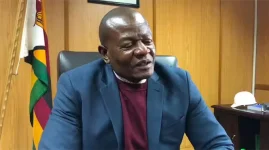Private businesses will help run important public services throughout Zimbabwe as the government looks for new ways to fix problems like not enough water in Harare. The Local Government Ministry teamed up with Harare city officials to sign a deal with Helcraw Electricals and Hangzhou Laison Technology Company, which will bring smart water meters. These meters make sure money keeps coming in to fix broken pipes, keep everything running well, and make water systems bigger - plus, they stop bills from going to homes that never see a drop of water. Minister Daniel Garwe explained on Wednesday that letting private companies handle Harare's water doesn't strip away city authority but instead makes every step of water delivery work better.
"We want private companies running both water systems and public services," said Garwe. "Business partners can help grow our cities through better service work, especially with water projects. We aren't taking control away from Harare or any city government - but many neighborhoods never receive water yet still pay monthly bills for nothing. Some places receive dirty water because the cleaning systems at Lake Chivero and Morton Jeffery don't work right. We need to fix everything about water delivery, which is why we asked companies to step in and clean the water, move it through pipes, handle customer bills, and install those new smart meters."
Garwe believes this plan will stop pipe leaks, make water cleaning better at Morton Jeffrey Waterworks, and bring smart meters that charge people just for the water they actually use. Water bills should cost less under this system than what families pay right now. Zimbabwe isn't alone in having private water companies - many countries do this, including neighboring South Africa. Both regular citizens and the city government will win from this change since Harare will keep part of all water payments.
"Our agreement puts Local Government in a watching role, but the main deal stands between Harare City and these investors," Garwe explained. "The city receives its share of money directly. We'll set up a special bank account where water payments first land. From there, investor money goes to investors; city money goes to city officials. You pay once, everyone gets their fair share, and clean water flows to your home."
Workers will build a brand new water treatment plant in Mabvuku that cleans water coming from Kunzvi, Machekeranwa, and Wenimbi Dams before sending it to homes in north and east Harare, plus nearby smaller towns. They picked Mabvuku because it sits near the highest spot in Harare Metro, even higher than fancy hillside neighborhoods like Glen Lorne and Borrowdale. This smart location means less money spent on water cleaning chemicals and cleaner drinking water for everyone.
This push for business help with water came after private companies already fixed trash problems through the successful Geo-Pomona project. "Private business partnerships work best for these issues. We need local companies stepping up alongside foreign investors to improve public services," Minister Garwe stated. Harare leaders had asked for government help earlier, saying unpaid bills totaling over $5 million made it impossible to provide basic services. The water project fits into bigger government plans that use private money to rebuild public systems and create a better living for all citizens.
"We want private companies running both water systems and public services," said Garwe. "Business partners can help grow our cities through better service work, especially with water projects. We aren't taking control away from Harare or any city government - but many neighborhoods never receive water yet still pay monthly bills for nothing. Some places receive dirty water because the cleaning systems at Lake Chivero and Morton Jeffery don't work right. We need to fix everything about water delivery, which is why we asked companies to step in and clean the water, move it through pipes, handle customer bills, and install those new smart meters."
Garwe believes this plan will stop pipe leaks, make water cleaning better at Morton Jeffrey Waterworks, and bring smart meters that charge people just for the water they actually use. Water bills should cost less under this system than what families pay right now. Zimbabwe isn't alone in having private water companies - many countries do this, including neighboring South Africa. Both regular citizens and the city government will win from this change since Harare will keep part of all water payments.
"Our agreement puts Local Government in a watching role, but the main deal stands between Harare City and these investors," Garwe explained. "The city receives its share of money directly. We'll set up a special bank account where water payments first land. From there, investor money goes to investors; city money goes to city officials. You pay once, everyone gets their fair share, and clean water flows to your home."
Workers will build a brand new water treatment plant in Mabvuku that cleans water coming from Kunzvi, Machekeranwa, and Wenimbi Dams before sending it to homes in north and east Harare, plus nearby smaller towns. They picked Mabvuku because it sits near the highest spot in Harare Metro, even higher than fancy hillside neighborhoods like Glen Lorne and Borrowdale. This smart location means less money spent on water cleaning chemicals and cleaner drinking water for everyone.
This push for business help with water came after private companies already fixed trash problems through the successful Geo-Pomona project. "Private business partnerships work best for these issues. We need local companies stepping up alongside foreign investors to improve public services," Minister Garwe stated. Harare leaders had asked for government help earlier, saying unpaid bills totaling over $5 million made it impossible to provide basic services. The water project fits into bigger government plans that use private money to rebuild public systems and create a better living for all citizens.












